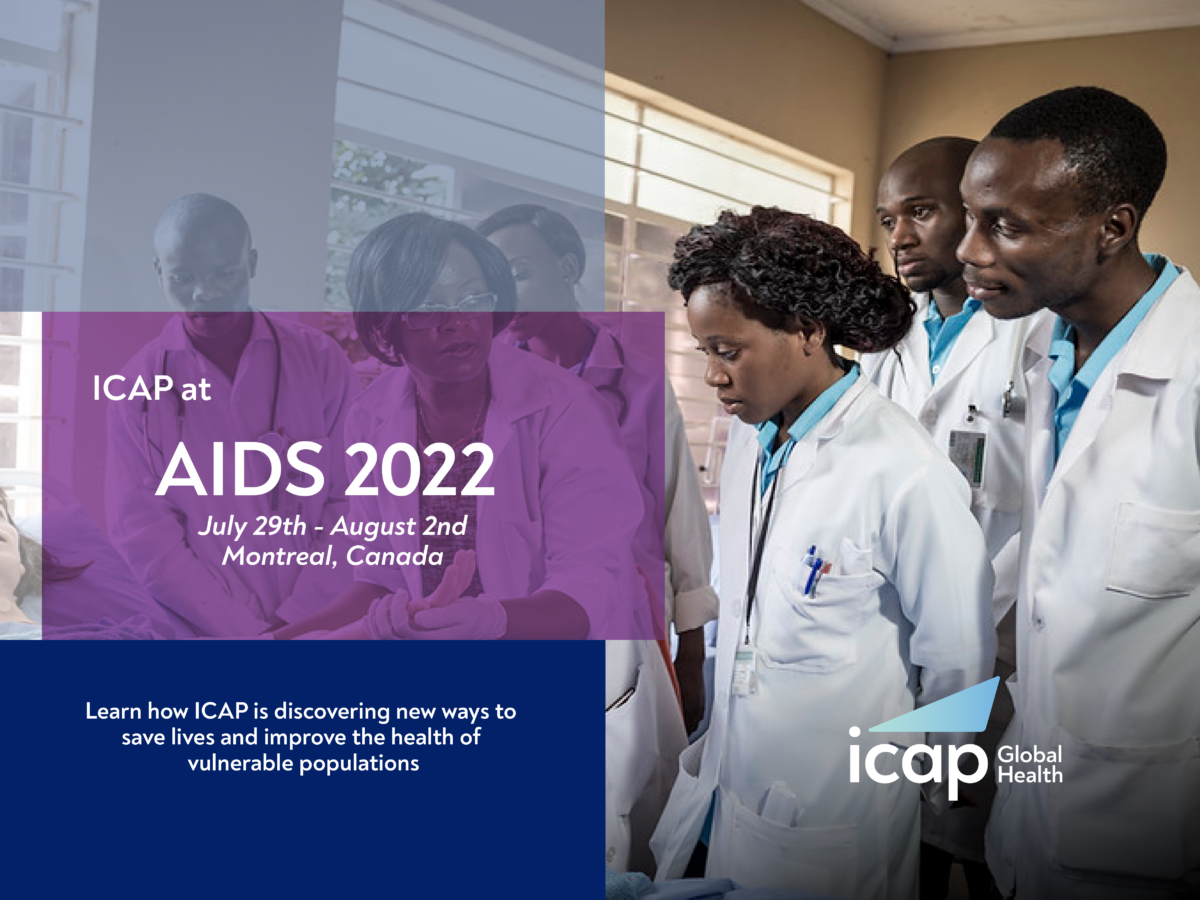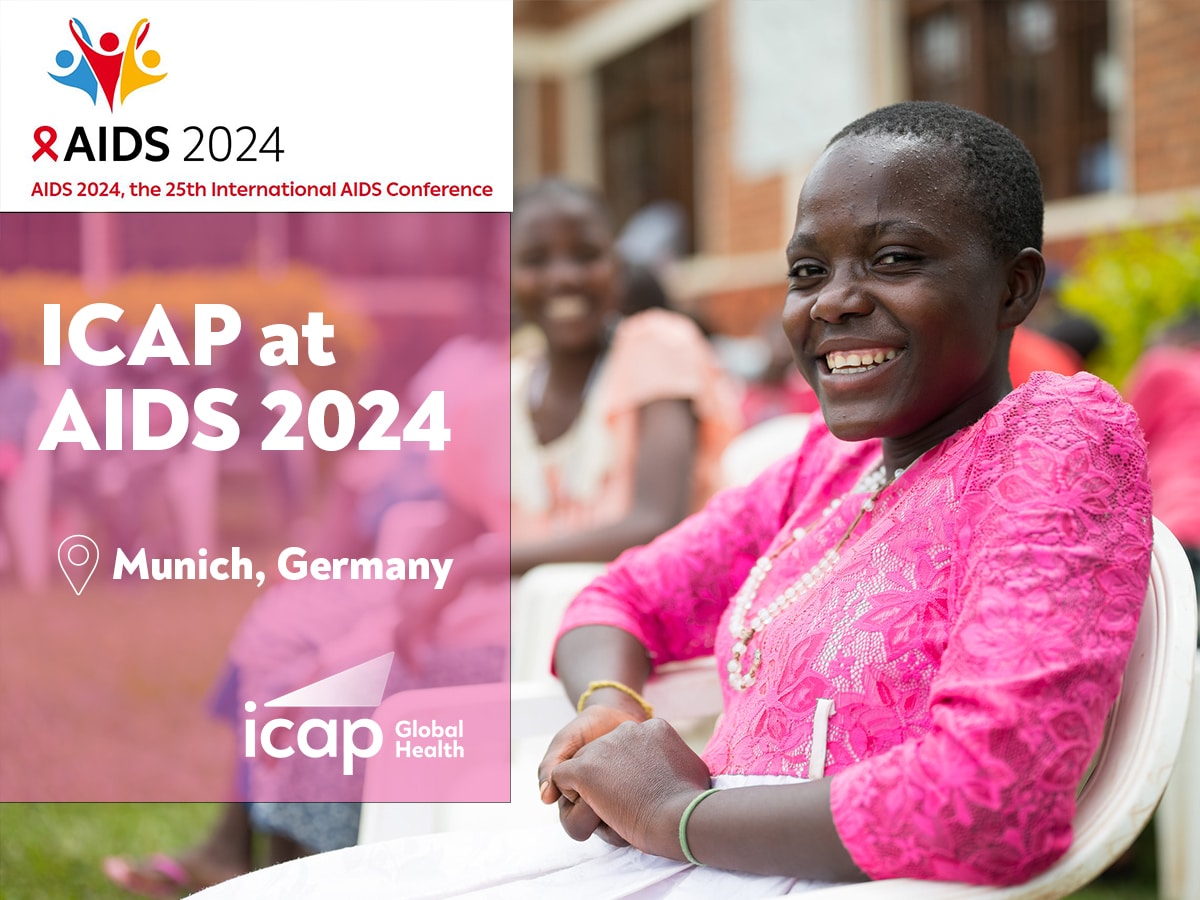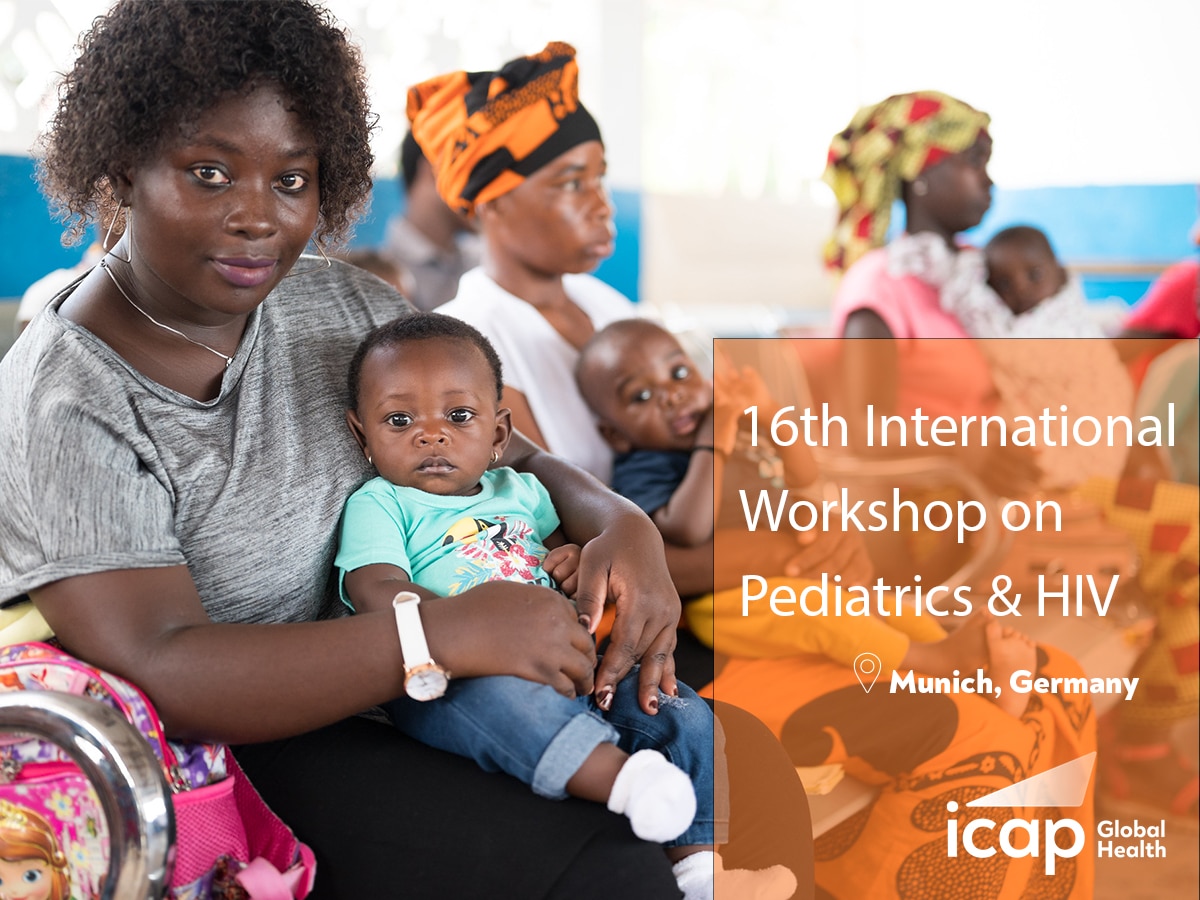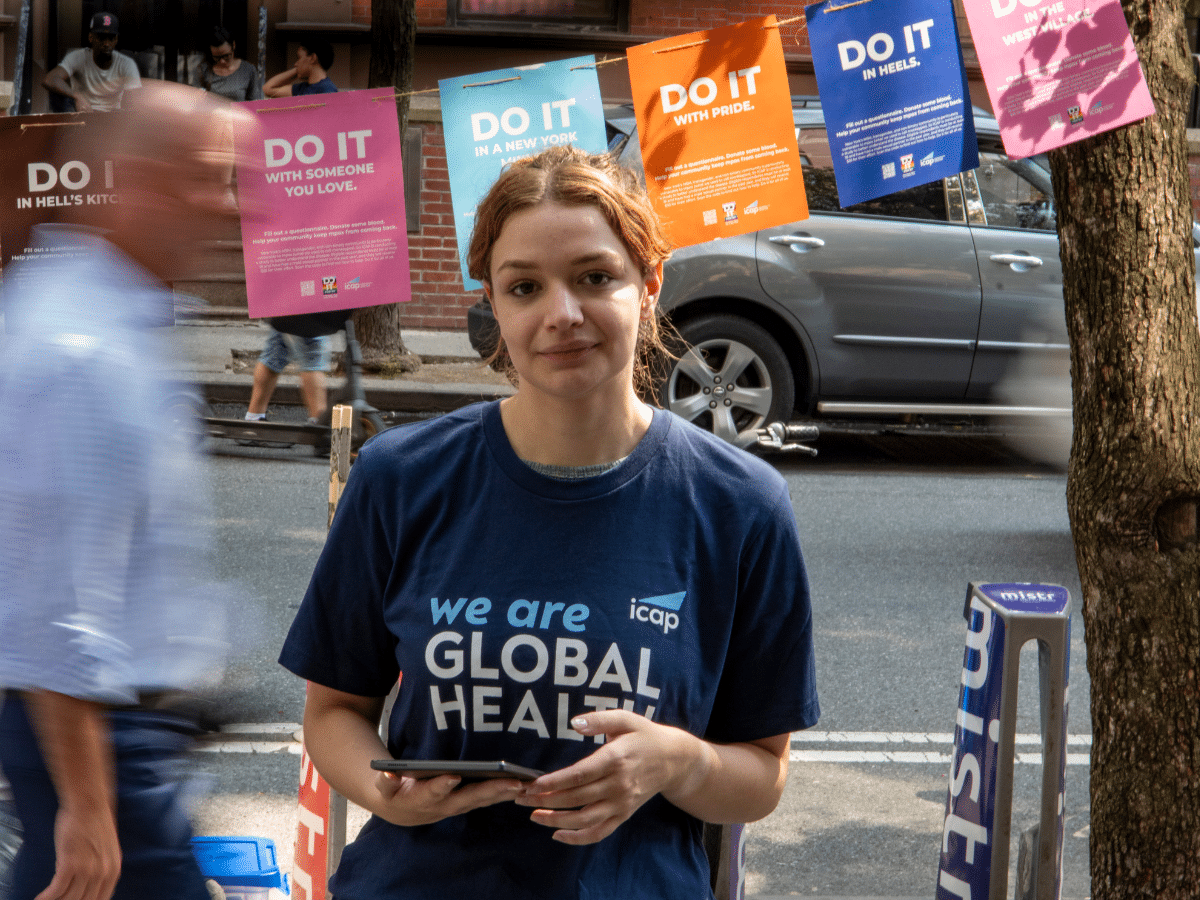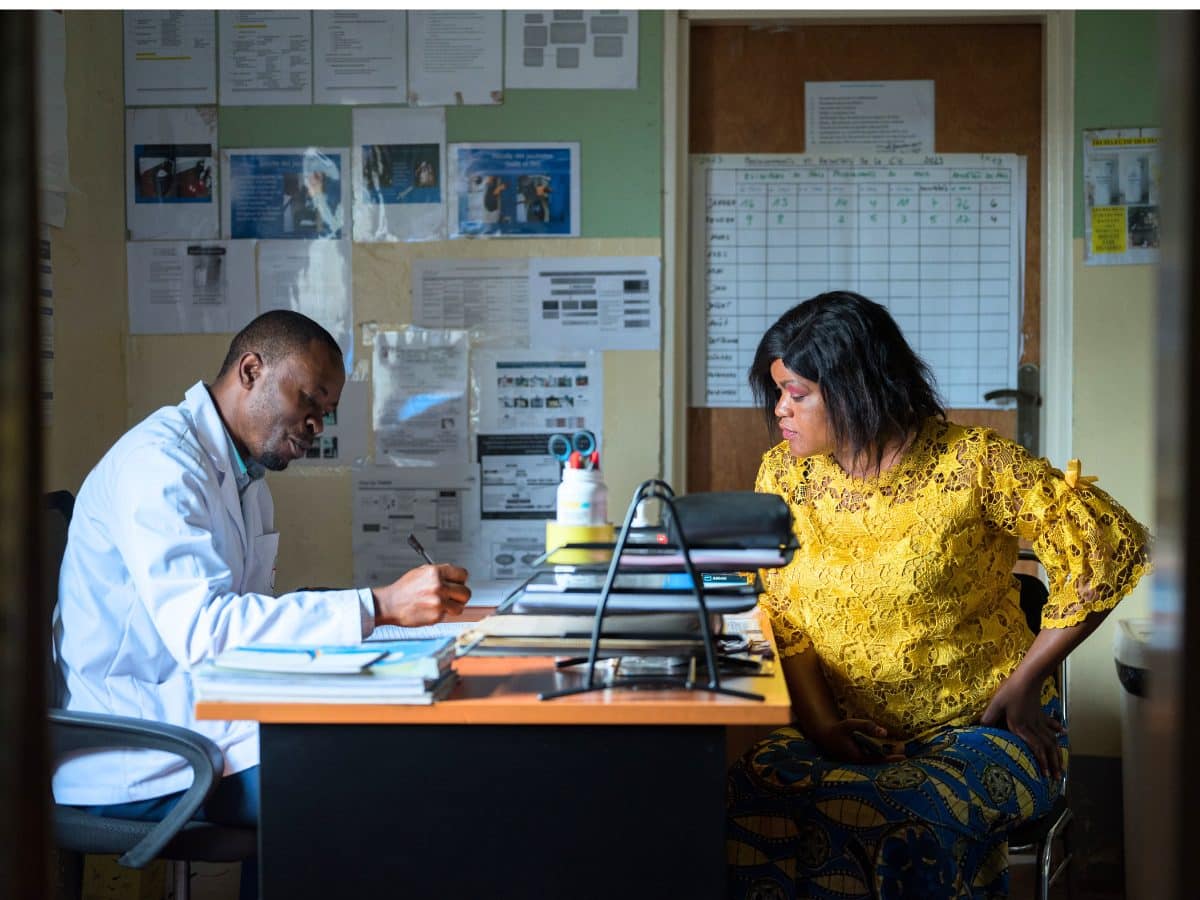-
Date: July 29 - August 2, 2022
-
Location: Montreal, Canada
Click for conference information
Click for ICAP listings in the online conference program
Pre-conference Session
Differentiated Service Delivery for HIV Treatment in 2022 – Session 1: DSD for HIV Treatment in 2022: Building stronger HIV Program Resilience (PC21)
Thursday, July 28, 9:00 a.m. – 10:00 a.m.
Room 510/Channel 8
Organizer:
International AIDS Society
Co-Chairs:
Wafaa El-Sadr, ICAP at Columbia University
Nittaya Phanuphak, Thai Red Cross AIDS Research Center, Thailand
Summary:
This opening session will provide the background and framing for the pre-conference.
https://programme.aids2022.org/Programme/Session/488
Global Village Sessions
Beyond Addictophobia: Addressing Injection Risks and Drug-Linked Sexual Behaviors in HIV Prevention Science and Care
Saturday, July 30, 1:15 p.m. – 2:15 p.m.
Room 2/ Global Village Channel
Summary:
This workshop will highlight the importance of utilizing a health equity lens while examining the degree to which studies may be generalizable when people who inject drugs or people who use drugs are not assessed and/or are excluded from significant participation. It will focus on the ‘culture of knowledge creation and how critical it is to deconstruct/reconstruct paradigms about how clinical and behavioral trials are designed and operated. It will also explore critical questions related to addictophobia and implicit bias in HIV and AIDS clinical research and offer guidance for how NIH and the HIV/AIDS Clinical Trials Networks can re-imagine harm reduction.
https://programme.aids2022.org/mobile/village/VillageSession
Satellite Sessions
Satellite: Differentiated Testing Services: Optimizing Program Design to Enhance Testing and Linkage (SA018)
Friday, July 29, 1:00 p.m. – 2:30 p.m.
Room 524/Channel 9
Organizers:
ICAP at Columbia University and the Clinton Health Access Initiative (CHAI)
Summary:
This satellite session will explore the use of the differentiated service delivery (DSD) approach to design high-impact HIV testing services, focusing on model designs that reach populations in need and effectively link HIV-negative clients to prevention and HIV-positive clients to treatment. Case studies from Africa will be presented by ministries of health and community-led organizations.
https://programme.aids2022.org/Programme/Session/64
Satellite: The Road to Zero: Successes, Learnings, and the Work Ahead to End Advanced HIV Disease-Related Mortality (SA010)
Friday, July 29, 1:00 p.m. – 2:30 p.m.
Room 518/Channel 10
Organizers:
Clinton Health Access Initiative (CHAI) and UNITAID
ICAP Presenter:
Maureen Syowai
https://programme.aids2022.org/Programme/Session/116
Satellite: Accelerating Investigation of Novel Therapeutics in Pregnancy: From Theory to Action (SA024)
Friday, July 29, 2:45 p.m. – 4:15 p.m.
Room 516/Channel 6
Organizers:
The World Health Organization (WHO), Unitaid, and the International Maternal Pediatric Adolescent AIDS Clinical Trials (IMPAACT) Network
Summary:
The aim of the satellite is to launch the JIAS supplement on approaches to enhance and accelerate the investigation of new HIV drugs in pregnancy, discuss the strategic actions required and explore the application of this work to HIV-related co-infections. The satellite will be a combination of engaging panels with a diverse range of key stakeholders that will 1) focus on actions to effectively implement the proposed framework, 2) highlight the voices of community members who will discuss the effective and meaningful support of participants in research and 3) explore the application of the proposed framework to other disease areas (STIs, viral hepatitis, malaria, and TB).
Highlight: Official Launch of JIAS Supplement and Overview of the Framework to Enhance and Accelerate the Study of New HIV Drugs in Pregnancy
Annette Sohn, amfAR, the Foundation for AIDS Research, Thailand
Elaine Abrams, IMPAACT Network & ICAP at Columbia University, United States
Martina Penazzato, World Health Organization, Switzerland
https://programme.aids2022.org/Programme/Session/106
Satellite: Recent Infection Surveillance as a Tool to Monitor Trends and Sharpen Prevention Strategies to Reach and Sustain HIV Epidemic Control? (SA026)
Friday, July 29, 2:45 p.m. – 4:15 p.m.
Room 510/Channel 8
Organizers:
Tracking with Recency Assays to Control the Epidemic (TRACE) UCSF, ICAP, and CDC
Summary:
Monitoring recent HIV infections in a population can provide public health officials with a potential signal of gaps in epidemic control and inform HIV prevention, care and treatment programming and public health response. The Tracking with Recency Assays to Control the Epidemic (TRACE) initiative has supported Ministries of Health to implement recent infection surveillance in over 20 countries since 2018. In this satellite session, TRACE country representatives will present case studies of how recent infection surveillance data are being used to strengthen national public health responses to the HIV epidemic. The satellite will feature presentations and a moderated discussion of lessons learned from TRACE-supported countries on the use of recent infection surveillance data to inform prevention, care, and treatment programming and public health response to accelerate and sustain epidemic control, focusing on how they have each harnessed this surveillance tool in their own unique national contexts. The presentation and exchange will be useful to other countries that are implementing or considering introducing recent infection surveillance into their own national plans.
Co-Chair:
Jessica Justman, MD, Senior Research Director, ICAP
https://programme.aids2022.org/Programme/Session/135
Satellite: Differentiated Service Delivery for Advanced HIV Disease: A Health Systems Strengthening Approach to Improving the Coverage and Quality of AHD Services (SA036)
Friday, July 29, 6:15 p.m. – 7:45 p.m.
Room 511/Channel 7
Organizer:
ICAP at Columbia University
Moderators:
Wafaa El-Sadr, ICAP at Columbia University
Miriam Rabkin, ICAP at Columbia University
Lee Abdefadil, Global Fund, Switzerland
Summary:
This session will focus on the need to strengthen health systems to optimize the care and treatment of people with advanced HIV disease (AHD), and on lessons learned from the 21-country CQUIN learning network. The CQUIN AHD community of practice includes representatives of ministries of health, donors, implementing partners, and people living with HIV. In 2021-2022, this group conducted systematic assessments of national AHD programs in 13 African countries using a capability maturity model. The satellite will include panelists and moderators from the World Health Organization, the Global Fund, PEPFAR, ICAP at Columbia University, CHAI, the Ministries of Health of Eswatini, Nigeria, and Zambia, and the National Empowerment Network of People Living with HIV in Kenya (NEPHAK).
https://programme.aids2022.org/Programme/Session/60
Satellite: Differentiated Service Delivery for People Who Inject Drugs (PWID) in Africa: Priorities and Lessons Learned
Sunday, July 31, 5:45 p.m. – 7:15 p.m.
Room 516/Channel 6
Moderator:
Cassia Wells, ICAP Columbia University
Organizers:
ICAP at Columbia University, FHI 360’s Meeting Targets and Maintaining Epidemic Control (EpiC) project, the South-to-South HIV prevention learning network, and the International Network of People who Use Drugs
Summary:
This session will focus on the importance of designing person-centered HIV prevention, testing, and treatment models for people who inject drugs (PWID) in Africa. Co-hosted by ICAP at Columbia University, FHI 360’s EpiC project, the South-to-South HIV prevention learning network (SSLN), and the International Network of People who Use Drugs (INPUD) the session will include a framing presentation on the importance of differentiated service delivery for PWID, case studies from diverse PWID projects in Nigeria, Mozambique, and Kenya, and a panel discussion with representatives of people who use drugs from the Tanzania KVP Forum, the South Africa Network of People who Use Drugs (SANPUD) and EMPOWER Cameroon. Moderators will include representatives from the Global Fund, USAID and AfricaNPUD, ICAP, SSLN, and FHI360.
https://programme.aids2022.org/Programme/Session/61
Satellite: Launch of the Global Alliance Initiative to End AIDS in Children by 2030: Building Partnerships, Communities, and Innovation (SA093)
Monday, August 1, 5:45 p.m. – 7:15 p.m.
Room 517c/Channel 5
Organizers:
WHO, UNICEF, UNAIDS
Summary:
In this satellite session, we would introduce and launch The Global Alliance to end AIDS in children, a Global Strategic Initiative to end AIDS in children by 2030. Specific objectives of this Satellite Session are to: 1. To present the ‘Global Alliance’ to national governments, funders, implementing partners and regional and country-based organizations, community-led organizations, faith communities and organizations, and civil society networks including of women and youth living with HIV; 2. To discuss the Alliance’s organization, stakeholder contributions, structure, objectives and expected key outcomes; 3. To deliberate on the way forward for the prioritized interventions; 4. To launch the Alliance.
Highlight: Facilitated Panel Discussions on Accountability, Advocacy, and Addressing Structural Barriers to HIV Response for Results
Nandita Sugandhi, Pediatrician and Child Health Activist, Senior Technical Specialist and Associate Research Scientist, ICAP at Columbia University, United States
The Coalition for Children Affected by AIDS (CCABA), Global Advocacy, South Africa
Luann Hatane, Paediatric – Adolescent Treatment Africa, South Africa
Josephine Nabukenya, Makerere University Johns Hopkins University Research Collaboration, Uganda
Nicola Willis, Executive Director, Africaid Zvandiri, Zimbabwe
https://programme.aids2022.org/Programme/Session/195
Oral Abstract
Differentiated Service Delivery for people with HIV and Non-Communicable Diseases: South African Policy enabler for Integration
Saturday, July 30, 2:15 p.m. – 3:15 p.m.
Room 516/Channel 6
Participant:
Musa Manganye, ICAP Columbia University, South Africa
Malawi’s Progress Towards the UNAIDS 95-95-95 HIV Testing and Treatment Targets: Comparison of the 2015-16 and 2020-21 Malawi Population-based HIV Impact Assessments (MPHIA)
Saturday, July 30, 2:15 p.m. – 3:15 p.m.
Participant: Danielle Payne
Prevalence and individual and community-level risk factors of late diagnosis among newly diagnosed people living with HIV from nine African countries
Sunday, July 31, 11:45-12:45
Participant: Kavitha Ganesan
HIV and suicide risk across adolescence and young adulthood: an examination of sociodemographic, contextual, and psychosocial risk factors for attempted suicide in a longitudinal cohort of youth affected by HIV
Tuesday, August 2, 2:15 p.m. – 3:15 p.m.
Participant: Philip Kresniske
Real-time HIV Surveillance to Achieve Fast-Track Milestones (OAC01)
Sunday, July 31, 10:30 a.m. – 11:30 a.m.
Room 517c/Channel 5
Moderator:
Jessica Justman, ICAP Columbia University
https://programme.aids2022.org/Programme/Session/196
Posters
‘Guys are different’: young women’s views on heterosexual relationship dynamics and how they influence women’s potential PrEP uptake and disclosure in Durban, South Africa
Lori Miller
Influence of descriptive network norms on injection behaviors among people who inject drugs during the COVID-19 pandemic: a latent profile analysisa
Cho-Hee Shrader
Integrating 3HP-based Tuberculosis Prevention Treatment (TPT) into Zimbabwe’s Fast Track Model
Munyaradzi Mapingure
Adherence to Antiretroviral Therapy Among Recently Pregnant HIV-Positive Women in 8 African Countries
Sarah Chung
Analysis of HIV Case Finding and Continuity on Treatment Strategies and Outcomes Before and During the COVID-19 Pandemic: The RISE Nigeria Experience
Yemisi Ogundare
Assessing PrEP Uptake of HIV Negative Contacts of Index Client: RISE Experience
Babafemi Dare
Circumventing the Impact of COVID-19 Pandemic on Access to HIV-1 RNA Assay in Nigeria
Timothy Yakubu
Comparing HIV Risk Profiles of Recent and Long-Term HIV Infection Cases Using Population-Based HIV Impact Assessment (PHIA) Data from 12 Countries in Sub-Saharan Africa
Cassia Wells
COVID-19 Vaccination Rates and Correlates Associated with Nonvaccination Among the LGBTQ+ Population in New York City
Connor Wright
Effect of COVID-19 on HIV Prevention Among the LGBTQ+ Population in New York City
Joey Platt
Factors Associated with Viral Load Suppression after Enhanced Adherence Counseling in HIV Seropositive Clients with an Initial High Viral Load in RISE Facilities
Benjamin Obasa
High Demand for HIV Pre-exposure Prophylaxis (PrEP) Services Amongst Key Populations in Sierra Leone: Early Lessons from the Country’s First PrEP Program
Eric Ikoona
Impact of the COVID-19 Pandemic and Related Restrictions on the Lives of Young People Living with HIV in Kisumu, Kenya
Jennifer Zech
Increasing Men’s Access to HIV Prevention and Care and Treatment Services in Nampula, Mozambique
Thais Ferreira
Mobile Clinics Improve HIV Testing, ART Initiation, and Treatment Continuation Among Female Sex Workers in Nampula Province, Mozambique
Marzio Stefanutto
Prevalence and Individual and Community-level Risk Factors of Late Diagnosis Among Newly Diagnosed People Living with HIV from Nine African Countries
Kavitha Ganesan
Self-Reported Antiretroviral Therapy Use and Detection of Antiretrovirals: Findings from Sequential Population Surveys in Malawi
Mansoor Farahani
Use of Machine Learning in Predicting and Improving Retention in Care
Mukhtar Ijaiya


